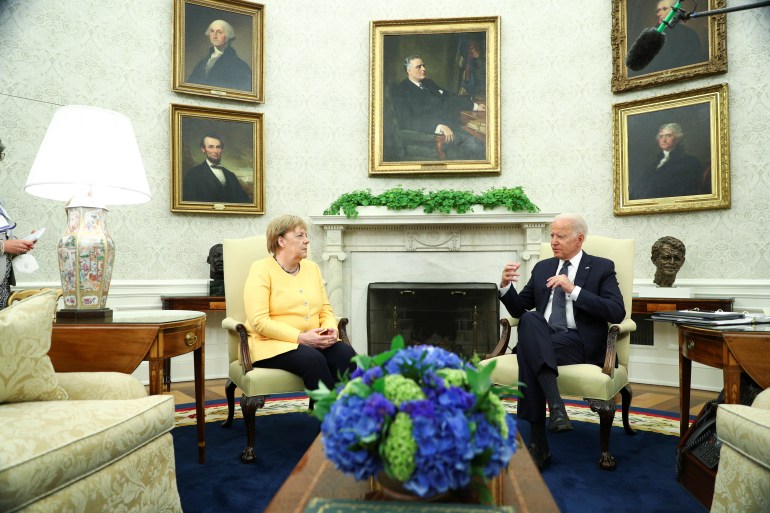Biden: Cuba ‘a failed state’ and is ‘repressing their citizens’
And as Haiti decends into chaos after the assassination of its president, Biden says he is not sending US troops there.

United States President Joe Biden, facing twin crises close to his country’s borders, on Thursday declared Cuba “a failed state” and said sending US forces into Haiti is not on his agenda at the moment.
Protesters have been demonstrating in Cuba since Sunday as anger has grown about shortages of basic goods, electricity and internet outages, curbs on civil liberties and the government’s handling of a surge in COVID-19 infections. The hardships are exacerbated by a decades-old US trade embargo that is being reviewed by Biden’s administration.
Keep reading
list of 4 itemsSome accused in Haitian assassination had US military training
Merkel voices shock as flood toll in Germany, Belgium exceeds 100
Could a Green Party chancellor lead Germany?
“Cuba is, unfortunately, a failed state and repressing their citizens,” Biden said Thursday at a joint news conference with German Chancellor Angela Merkel at the White House.
Amid calls from Republicans and Biden’s fellow Democrats to restore internet services to Cuba, Biden said his administration is looking into it.
“They’ve cut off access to the internet. We’re considering whether we have the technological ability to reinstate that access,” Biden said.
Meanwhile, there have been calls for the US to send troops to Haiti after President Jovenel Moise was shot dead early on July 7 at his Port-au-Prince home by what Haitian authorities describe as a unit of assassins, including 26 Colombians and two Haitian Americans.
The assassination has pitched the already troubled Caribbean nation into chaos, coming amid a surge in gang violence that has displaced thousands and hampered economic activity in the poorest country in the Americas.
Biden made it clear that the US is “only sending American marines to our embassy” for security purposes.
“The idea of sending American forces into Haiti is not on the agenda at this moment.”
Biden-Merkel meet
Biden welcomed Merkel to the White House Thursday to discuss disagreements about Russia and China as the two leaders seek to strengthen a relationship that suffered under former President Donald Trump.
The US and Germany are key NATO allies. Biden and Merkel have known and worked with each other for years.
But their two governments are at odds over a host of tough issues, including the Nord Stream 2 pipeline being built from Russia to Germany under the Baltic Sea, which Washington fears will hurt Ukraine and increase European reliance on Russian gas.
They also disagree about the wisdom of partnering with China on business projects, restrictions on travel to the United States from Europe, and Germany’s opposition to temporary patent waivers aimed at speeding up COVID-19 vaccine production.
On the Nord Stream 2 pipeline, “They didn’t resolve their differences, specifically, the United States came into this meeting knowing this was going to be a friction point between the two leaders and it appears they didn’t find any common ground,” Al Jazeera White House correspondent Kimberly Halkett said.

Merkel told reporters that Germany, Europe’s biggest economy, has different views on the pipeline from the US. But she said Berlin viewed Ukraine as a transit country, evidently meaning she believed that natural gas should still flow through Ukraine, even if the pipeline is completed.
Merkel said there are a “number of instruments” that Europe can take, including sanctions, if Russia does not meet commitments to Ukraine on the pipeline.
Russia says the $11bn pipeline, led by state energy company Gazprom and its Western partners, will be completed later this year.
Biden said that “good friends can disagree” on a project such as Nord Stream 2 and that both leaders have asked their teams to look at practical measures the countries can take on the pipeline if Ukraine’s energy security is weakened.
Biden, 78, and Merkel, 66, see eye to eye on a string of broader issues, and both want to strengthen the transatlantic relationship that suffered under Trump’s frequent, withering criticism of close US allies.
Merkel, chancellor since 2005, plans to exit Germany’s government after national elections in September, meaning she is likely to be seen as a “lame duck” in her final months in power.
Polling shows her Christian Democrats are poised to take the lead in forming a government after the election, but it remains unclear which parties would be included in a coalition.
Biden’s Democratic Party has tenuous majorities in the US Congress that could evaporate in the 2022 congressional elections.
Merkel’s White House visit – the first by a European leader since Biden took office in January – showed the US was trying to make amends with an ally that had often been attacked during the Trump years.